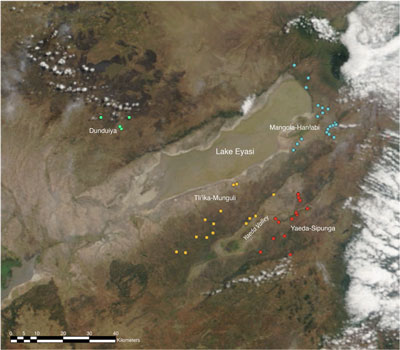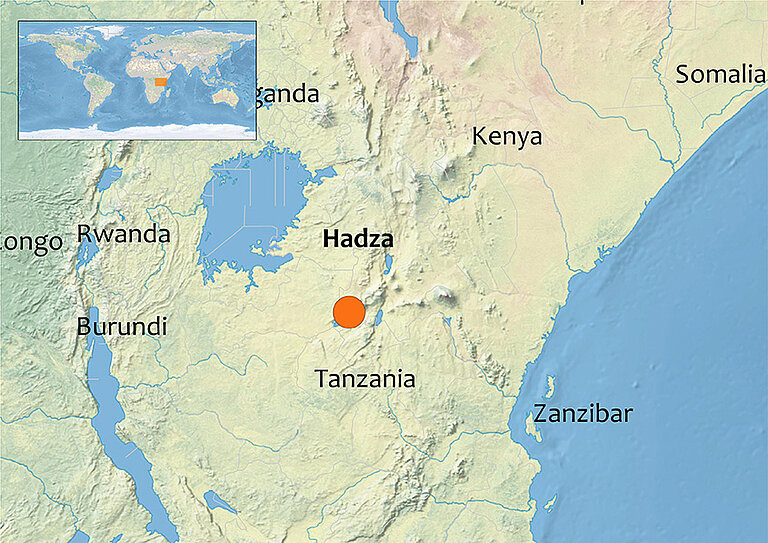Hadza Foragers - Northern Tanzania
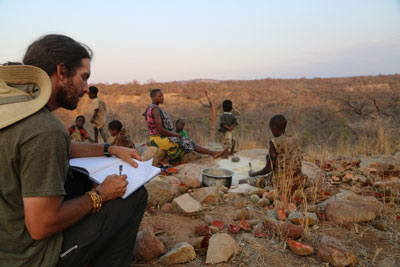
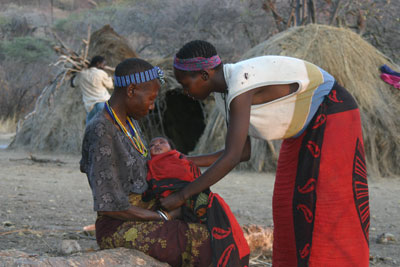
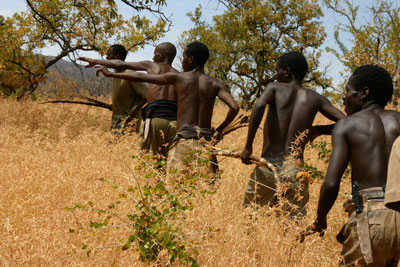
© for all images: Brian Wood
Description
Principal investigator: Brian Wood
Team members: Herman Pontzer, David Raichlen, Jacob Harris, Claire Spottiswoode, Audax Mabulla, Katie Sayre, Christian Kiffner, Gandhi Yetish, Bunga Paolo, Jenero Matias, Mariamu Anyawire
Research since: 2004
Site Details
The Hadza are a culturally, linguistically, and genetically distinct population of approximately 1200 individuals, living around Lake Eyasi, in northern Tanzania. Culturally, they are distinguished by being the only population in east Africa that continues to rely extensively on hunting and gathering for their subsistence. Linguistically, they speak Hadzane, a click-language that has phonetic similarities to Khoisan click-languages but is not mutually intelligible with any. The Hadza live in a semi-arid woodland habitat dominated by Acacia, Commiphora, and Adansonia digitata (Baobab) trees. The woodlands of Hadza country are typically hilly and rocky. Natural springs and seasonal rivers intersperse their range. On the edges of Lake Eyasi and the Yaeda Valley, rocky hills give way to sandy alluvial plains. The area can be quite hot, dry, and windy during the dry season (June-Oct) but is lush and green during the rainy periods. The Hadza’s subsistence economy is closely coupled to the woodland-savannah ecology in which they live, while also being guided by distinctive cultural ethos. Being mobile is an essential part of Hadza culture. The composition of Hadza residential groups, or camps, is often in flux, as people move through the landscape to visit friends and family, find better foraging opportunities, or peacefully diffuse social tensions. Sharing, minimal status distinctions, and the freedom to the move are unmistakable features of Hadza culture.
Research
Our research with the Hadza community focuses on the behavioral ecology of food production and food sharing systems, demography, movement ecology, and evolutionary approaches to human biology and health. We aim to test hypotheses about how evolutionary and ecological processes shape features of human physiology, anatomy, behavior, and social organization. We collect data using observation, interviews, and experiments. We develop and apply state of the art methods to measure daily economic activities, characterize patterns of physical activity, sleep, spatial behavior, and energy use. We also employ minimally invasive methods to collect health biomarker data.
PI Wood has lived and worked with the Hadza every year since 2004. Coupled with our ongoing research projects, our team is deeply engaged in efforts to improve the Hadza community’s access to health care. We founded and operate a non-profit organization, the Hadza Fund (hadzafund.org) which provides a year-round ambulance service, pays for needed hospital stays and medicine, and provides health outreach and education to remote communities.
Selected Recent Publications
Wood, B. (2022). xtracks: Software for the analysis of human movement patterns. https://doi. org/10.5281/zenodo.4734642.
Yamada, Y., Zhang, X., Henderson, M. E., Sagayama, H., Pontzer, H., et al. (2022). Variation in human water turnover associated with environmental and lifestyle factors. Science, 378 (6622) 909-915.
Cram, D. L., van der Wal, J. E., Uomini, N., Cantor, M., Afan, A. I., Attwood, M. C., et al., Wood, B., Wrangham, R., & Spottiswoode, C. N. (2022). The ecology and evolution of human‐wildlife cooperation. People and Nature, 4(4), 841-855.
van der Wal, J. E., Spottiswoode, C. N., Uomini, N. T., Cantor, M., Daura‐Jorge, F. G., Afan, A. I., Attwood, M. C., Amphaeris, J., Balasani, F., Begg, C. M., Blair, C. J., et al., Wood, B., Wrangham, R., Spottiswoode, C. N., & Cram, D. L. (2022). Safeguarding human–wildlife cooperation. Conservation Letters, 15(4), p.e12886.
Wood, B., Harris, J., Raichlen, D., Pontzer, H., Sayre, K., Sancilio, A., Berbesque, C., Crittenden, A., Mabulla, A., McElreath, R., Cashdan, E., & Jones, J. H. (2021). Gendered movement eco-logy and landscape use in Hadza hunter-gatherers. Nature Human Behavior, 5(4), 436-446.
Kraft, T. S., Venkataraman, V. V., Wallace, I. J., Crittenden, A. N., Holowka, N. B., Stieglitz, J., Harris, J., Raichlen, D. A., Wood, B., Gurven, M., & Pontzer, H. (2021). The energetics of uniquely human subsistence strategies. Science, 374(6575).
Wood, B., Pontzer, H., Harris, J., Mabulla, A. Hamilton, M., Zderic, T. and Raichlen, D. (2021). Step counts from satellites: methods for integrating accelerometer and GPS data for more accurate measures of pedestrian travel. Journal for the Measurement of Physical Behaviour, 3(1), 58-66.
Wood, B., Millar, R. S., Wright, N., Baumgartner, J., Holmquist, H., & Kiffner, C. (2021). Hun-ter-Gatherers in context: Mammal community composition in a northern Tanzania landscape used by Hadza foragers and Datoga pastoralists. PLOS One, 16(5), e0251076.
Pontzer, H., & Wood, B. (2021). Effects of evolution, ecology, and economy on human diet: Insights from hunter-gatherers and other small-scale societies. Annual Review of Nutrition, 41, 363-385.
Pontzer, H. et al. (2021). Daily energy expenditure through the human life course. Science, 373: 808-812.
Harris, J., Boyd, R., & Wood, B. (2021). The role of casual knowledge in the evolution of tra-ditional technology. Current Biology, 31(8), 1798-1803.
Sayre, M. K., Pontzer, H., Alexander, G. E., Wood, B. M., Pike, I. L., Mabulla, A. Z., & Raichlen, D. A. (2020). Ageing and physical function in East African foragers and pastoralists. Philosoph-ical Transactions of the Royal Society B, 375(1811), 20190608.
Raichlen, D., Pontzer, H., Zderic, T., Harris, J., Mabulla, A., Hamilton, M., & Wood, B. (2020). Sit-ting, squatting, and the evolutionary biology of human inactivity. Proceedings of the National Academy of Sciences, 117(13), 7115-7121.
Wood, B., Pontzer, H., Harris, J., Mabulla, A. Hamilton, M., Zderic, T., and Beheim, B., Raichlen, D. (in press) "Step counts from satellites: methods for integrating accelerometer and GPS data for more accurate measures of pedestrian travel". Journal for the Measurement of Physical Behaviour.
Wren, C., Botha, S., de Vynck, J., Hill, K., Marean, C., Shook, E., Harris, J., Janssen, M., Wood, B., Cowling, R., Fisher, E., Franklin, J. (2019) “The foraging potential of the Holocene Cape South Coast of South Africa without the Palaeo-Agulhas Plain”. Quaternary Science Reviews, 105789.
Rosinger, A., Pontzer, H., Raichlen, D., Wood, B., Tanner, S., and Sands, J. (2019) "Age-related decline in urine concentration may not be universal: Comparative study from the U.S. and two small-scale societies”. American Journal of Physical Anthropology (168): 705-716.
Pontzer, H., Wood, B., and Raichlen, D. A. (2018) “Hunter‐gatherers as models in public health”. Obesity Reviews (19): 24–35.
Pontzer, H., Raichlen, D., Basdeo, T., Harris, J., Mabulla, A., and Wood, B. (2017) "Mechanics of archery among Hadza hunter-gatherers." Journal of Archaeological Science: Reports (16): 57-64.
Wood, B., and Gilby, I. (2017) "Pan the hunter: Hunting by humans, chimpanzees, and our common ancestor" in Chimpanzees and Human Evolution, R. Wrangham, D. Pilbeam, and M. Muller, Eds., Harvard University Press.
Wood, B., Watts, D., Mitani, J., Langergraber, K., (2017) “Favorable ecological circumstances promote life expectancy in chimpanzees similar to that of human hunter-gatherers”. Journal of Human Evolution (105):41-56.
Raichlen, D., Pontzer, H., Harris, J., Mabulla, A., Marlowe, F., Snodgrass, J., Berbesque, C., Sancilio, A., and Wood, B. (2016) "Physical activity patterns and biomarkers of cardiovascular disease risk in hunter-gatherers". American Journal of Human Biology, 29:e22919.
Yetesh, G., Kaplan, H., Gurven, M., Wood, B., Pontzer, H., Manger, P., Wilson, C., McGregor, R., Siegel, J. (2015) "Natural sleep and its seasonal variations in three pre-industrial populations" Current Biology 25 (21) 2862-2868.
Wood, B., and Marlowe, F. (2014) "Toward a reality-based understanding of Hadza men's work: A response to Hawkes et al. (2014)" Human Nature 25(4) 620-630.
Wood, B., Pontzer, H., Raichlen, D, and Marlowe, F. (2014) “Mutualism and manipulation in Hadza-Honeyguide interactions” Evolution and Human Behavior (2014) 35(6) 540-546.
Hill, K., Wood, B., Baggio, J., Hurtado, A.M., Boyd, R. (2014) “Hunter-gatherer inter-band interaction rates: Implications for cumulative culture” PLoS ONE 9(7): e102806.
Raichlen, D., Wood, B., Gordon, A., Mabulla, A., Marlowe, F., Pontzer, H. (2013) “Evidence of Lévy walk foraging patterns in human hunter–gatherers” Proceedings of the National Academy of Sciences, USA, 111(2) 728-733.
Wood, B., and Marlowe, F. (2013) “Household and kin provisioning by Hadza men”, Human Nature 24: 280-317.
Pontzer, H., Raichlen, D., Wood, B., Mabulla, A., Racette, S., & Marlowe, F. (2012) “Hunter-gatherer energetics and human obesity”. PLoS ONE, 7(7), e40503.
Cashdan, E., Marlowe, F., Crittenden, A., Porter, C., Wood, B. (2012) “Sex differences in spatial cognition among Hadza foragers” Evolution and Human Behavior 33:274-284.
